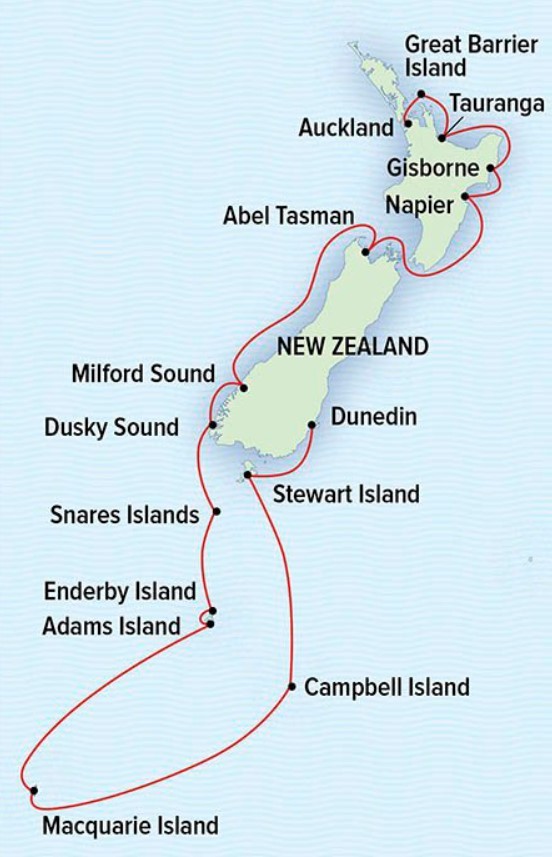2022-02-25
2025-01-01
Note: Current p/p indicative rate. Final price may change due to currency fluctuations.
Navigating New Zealand’s verdant coastlines we will encounter pristine beaches, quiet coves, and waters filled with whales, dolphins, and seals. The soaring peaks and countless waterfalls of the country’s dazzling fjords are at their jaw-dropping best in Fiordlands National Park, where we spend two days exploring Milford Sound and Dusky Sound. Step into an ancient rainforest, stunning national parks, and fragrant botanical gardens; learn about Maori history and culture and tour cosmopolitan cities.An ornithologist’s dream, New Zealand boasts 300 species of birds including the magnificent royal albatross and a colony of 20,000 gannets. Below the South Island in the Southern Ocean lie the remote and wildly beautiful sub-Antarctic islands where few humans have tread. Teeming with major populations of pelagic seabirds and animals and plants found nowhere else in the world, they burst with thousands of seals and millions of penguins.
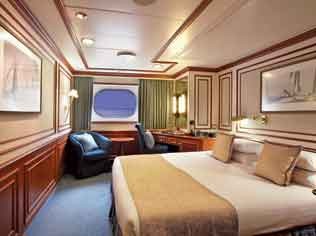
These cabins feature an oval window and two single beds, two beds that can be converted to a queen-size bed, or a queen size bed (call for details). You'll find an armchair, climate controls, reading lamps, and a TV. Bathrooms are also generously sized with a roomy glass-walled shower stall.
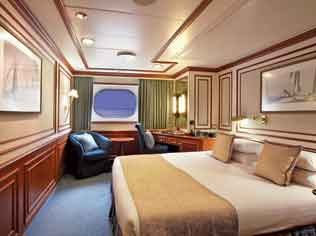
These roomy cabins feature an oval window and two single beds, two beds that can be converted to a queen-size bed, or a queen size bed (call for details). You'll find an armchair, climate controls, reading lamps, and a TV. Bathrooms are also generously sized with a roomy glass-walled shower stall.
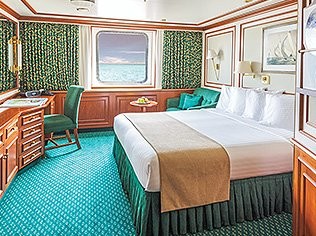
Cat 3 Suite with Window #401-412, 414-419 These suites have a comfortable sofa in the sitting area with a large window and plenty of storage. They have a variety of bed configurations (call for details) plus a writing desk and chair, climate controls, reading lamps, and a TV. Modern bathrooms are generously sized with roomy glass-walled shower stall.
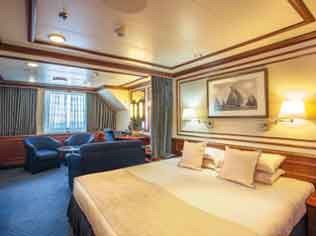
Cat 4 Deluxe suite with Window #511, 515 - These two suites feature separate sleeping and sitting areas, with a two-seater sofa that looks out a large rectangular window. Beds are configurable. You'll find storage, climate controls, reading lamps, a TV. Modern bathrooms are generously sized with roomy glass-walled shower stall.
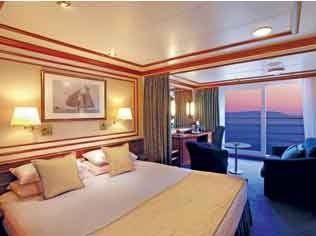
Cat 5 Suite with Balcony #501, 503-506, 508 - These spacious suites feature open living areas and sliding glass doors that open to a private French balcony. Beds are configurable, and you'll find sitting chairs or a couch, a writing desk, climate controls, reading lamps, and a TV. The bathroom is spacious and has a glass-walled shower.
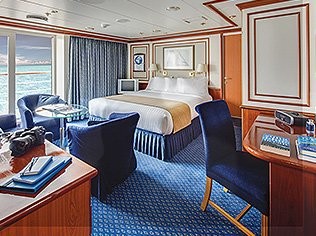
Cat 6 Owner’s suite with Balcony #502, 507, 509*, 510 - These large, owner's suites feature a balcony (Cabin 509 does not have a balcony), a spacious bathroom with a large shower and separate soaking tub with a window, and a large separate living area with a couch and two bucket chairs, plus climate controls, reading lamps, and a TV.
Arrive in Auckland, where we check in to our hotel. Join us for a welcome briefing this evening to meet your fellow travelers.
Have breakfast at the hotel before joining a tour of this vibrant city center. We’ll stop for lunch midday before embarking National Geographic Orion in the late afternoon. (B,L,D)
As we continue south along the North Island’s verdant coast, we let nature guide us as your Captain and Expedition Leader choose our next site for exploration. (B,L,D)
Today we delve into the cultural riches of Gisborne – the site of the first European landing place in New Zealand in 1769. The city’s warm, sun-filled climate reflects its disposition and complements its rich soils, bountiful islands, miles of sandy beaches and resource-rich oceans. Visit a local Marae and gain insight into the history and culture of the people of this region. In the afternoon, discover the greenery of a local arboretum, and cap the day off with a wine tour and tasting. (B,L,D)
Spend the morning getting to know Napier, the Art Deco capital of New Zealand. Choose to discover the city’s unique architecture on an art tour, or leave the city behind and join us on a Gannet Safari Tour where we’ll have close encounters at a large Australasian gannet colony. (B,L,D)
Today we arrive at the South Island of New Zealand where golden beaches and dense rainforests border the snow-capped Southern Alps. We begin discovering this stunning island in Abel Tasman National Park, exploring on hikes and walks with our naturalists. Spend the next day at sea as we sail south toward Fiordland National Park. (B,L,D)
Over the course of two days we will explore Fiordland National Park, home to fourteen individual fiords. Here we’ll discover hundredsmeter high waterfalls, snowcapped peaks, and we’ll hope for a glimpse of the Sounds’ resident bottlenose dolphins, fur seals, and penguins. (B,L,D)
Located south of the New Zealand mainland in the remote Southern Ocean, today we begin our exploration of the wild and beautiful sub-Antarctic islands. These remote islands play host to abundant and unique wildlife, with many species of birds, plants and invertebrates found nowhere else in the world. Two small rocky islands, North East and Broughton, comprise The Snares, the closest subantarctic islands to New Zealand. The islands are covered with heavy tussock grass and wind-beaten forests of tree daisies. The Snares are home to huge numbers of breeding birds: the 99 recorded species include albatross, Antarctic terns and Snares crested penguins. (B,L,D)
Spend the next several incredible days discovering New Zealand and Australia’s subantarctic islands and their surrounding waters —the entire marine landscape designated a UNESCO World Heritage site. We have special permission to explore these strictly regulated islands, which are protected at the highest level of conservation status by the New Zealand government, and considered “bird central” among top ornithologists around the world. Keeping a flexible weather-dependent schedule, we plan to explore several intriguing islands. The Auckland Islands are the largest of New Zealand’s subantarctic islands, with the richest flora, prolific birdlife, and an interesting human history. Conditions permitting, we cruise in Zodiacs to Enderby Island to view a large New Zealand sea lion colony with pups all jostling for position. If we are fortunate, we may see rare yellow-eyed penguins as they move to and from their nests in the forests beyond the beach.
We will spend two days at remote Macquarie Island, a protectorate of Australia and a World Heritage site. Macquarie is home to a large variety of wildlife, including thousands of seals and millions of penguins. Four species of penguin breed here. The endemic royal penguin has a population estimated at 850,000. Gentoo and southern rockhopper penguins also breed here. And imagine landing on a single beach with 100,000 pairs of king penguins, the third largest such colony in the world! With whales beneath and birds above, our time at sea between islands presents an opportunity to head up to the bridge to spot marine life and watch the calm business of navigation. Or spend these days enjoying the ship’s spa, and fitness center. Take some time to browse the library or play a board game in the glass-enclosed observation lounge. And listen to a variety of engaging talks from our staff, including photo talks. (B,L,D)
A large island, surrounded by 4 smaller islands and innumerable rocks and islets, the Campbell Island group is officially the southernmost territory of New Zealand. Covered with endemic grasses and thick vegetation and boasting steep terrain, Campbell is dramatic and beautiful. Here we will find six species of albatross, an endemic duck (the Campbell Island teal), and an endemic snipe, as well as numerous songbirds and sea birds who breed on the island. Three species of penguin also make their home on here, and southern right whales breed in the surrounding waters.
Stewart Island, known in Maori as Te Punga o Te Waka a Maui, is positioned firmly at the heart of Maori mythology. Today we’ll explore the island’s rare native birdlife as well as it’s well preserved podocarp forest. In the afternoon, discover Stewart Island’s nearby neighbor, Ulva Island, where we’ll hike with naturalists to discover its unspoiled rainforest. (B,L,D)
Today we disembark on New Zealand’s South Island in Dunedin, known for its Victorian and Edwardian architecture. Have breakfast aboard before transferring to the airport for flights home. (B)
Itineraries are subject to change.
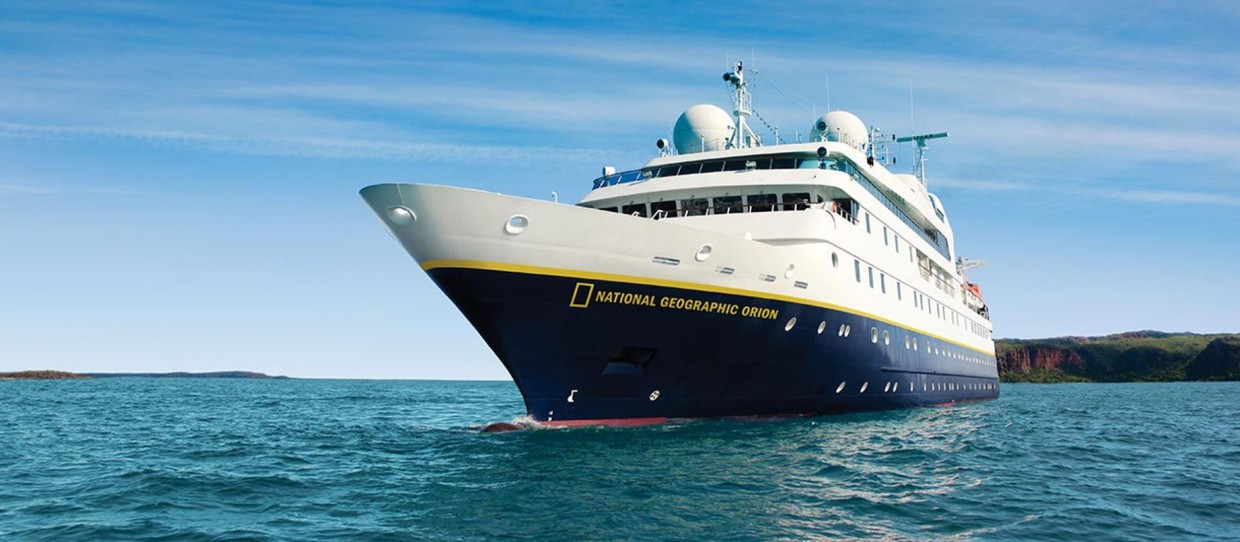
Vessel Type: Luxury Expedition Length: 103 metres Passenger Capacity: 102 (in 53 cabins) Built: 2003 / Refurbished 2014 Engineered for maximum comfort and safety, Orion is equipped with the latest technology including large retractable stabilizers, sonar, radar, and an ice-strengthened hull. A shallow draft plus bow and stern thrusters provide the convenience of being able to maneuver close to shore. 14 Zodiacs ensure quick disembarkation and offer the ideal transport for up-close exploration. National Geographic Orion meets strict specifications for environmental protection and the on board waste management systems meet the stringent Antarctic operational standards enabling us to travel to the most pristine environments. A host of advanced design features and technology ensures sustainable marine environmental practices. National Geographic Orion accommodates 102 guests in 53 cabins, including several with balconies. She is spacious and modern, with a variety of public rooms that offer panoramic views of the passing landscape. Friendly and informal, Orion fosters a welcoming atmosphere where like-minded guests share in exceptional experiences and enrichment. Her public rooms include a dramatic window-lined main lounge, as well as an observation lounge and library perched at the very top of the ship, with plentiful observation decks. The spacious lounge is the heart of our expedition community, and is suited for spirited cocktail hours, informative presentations and our nightly tradition of Recap. In addition, a dedicated theater provides a unique setting for specialist presentations or films and slideshows. Both the main dining room and outside buffet easily accommodate all guests at once for open seating dining. On selected nights, weather permitting, our dining room menu is also available on the outside deck. While Orion interiors are elegant, life aboard is always casual, with no need for formal clothing. And you’ll find shipboard services like laundry, in-room cabled internet, and public-area wifi.
• Immerse yourself in unparalleled beauty: scenic beaches and lush native forests in the North Island and deep fjords and dramatic landscapes in the South Island. • Discover the history and dynamic culture of New Zealand and the Maori people. • Explore the sub-Antarctic islands which remain almost completely protected from human activity and are home to a diverse collection of endemic plant and animal species • Delve into New Zealand’s cultural riches – from Napier’s Art Deco architecture, to historical Maori sites. • Visit Abel Tasman National Park where we’ll discover its golden sand beaches, abundant bird and sea life and native forests.
